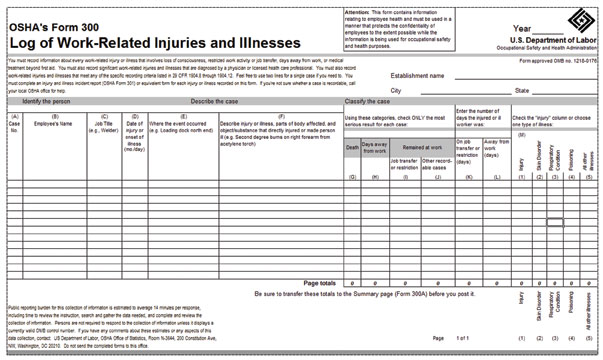
Is it Work-Related? OSHA Answers Common Recordkeeping Questions
Determining when an injury or illness is work-related for the purposes of OSHA 300 recordkeeping can be a challenge. While the distinction may seem straightforward, applying OSHA’s criteria to real-world situations is often anything but. In two recent letters of interpretation (LOIs), OSHA attempts to shed light on some common questions surrounding the work-relatedness of injuries that result from motor vehicle accidents. Keep reading to learn what OSHA has to say.
Company vehicles used for commuting
In general, OSHA has never considered injuries resulting from motor vehicle accidents that occur during employees’ normal commutes to be recordable. Injuries sustained by employees traveling on company business, however—such as a salesman driving to and from an appointment with a client—are considered recordable.
But in practice, many employers struggle to apply this rule. For example, if an employee drives a company vehicle, does that make an injury sustained in a motor vehicle accident during the commute work-related, and therefore recordable? OSHA says no.
In an LOI dated April 13, 2015, OSHA states that “the mode of transportation is not determinative of OSHA’s definition of an employee’s commute.” In other words, if an employee sustains an injury during his or her normal commute to and from home, the fact that he or she was driving a company vehicle does not change the situation; the injury still is not considered work-related and is not recordable. Read the full LOI here.
Personal activities while on travel status
Although injuries that occur while an employee is traveling on company business (outside of the normal commute) generally are considered recordable, there are a few exceptions. Namely, if an employee takes a side trip or detour for personal reasons, any injuries sustained during the detour typically are not considered work-related and are not recordable.
An employer recently wrote to OSHA for clarification regarding this “personal activities” exemption. In the employer’s scenario, an employee returning home from the airport following a business trip took a slight detour from his normal route home to visit a convenience store to purchase gas, food for himself, and a flower for his wife. After leaving the store, the employee took a surface street toward a highway that would take him home and was injured in an automobile accident.
OSHA determined that this scenario did not fit the “personal activities” exemption. According to a February 12, 2015, LOI, that exemption is meant to apply to true side trips such as vacations, sight-seeing excursions, or visits to relatives. The visit to the convenience store, OSHA concluded, did not fit into this category because the employee was traveling on a “reasonably direct route of travel to his home,” and “stopping for gas and food are normal activities involved in business travel.” Therefore, the incident described would be considered work-related, and the injuries the employee sustained would be recordable. Read the full LOI here.
OSHA recordkeeping refresher
OSHA has a four-part test to determine whether an injury or illness must be recorded in the OSHA 300 Log. In order for an injury or illness to be considered recordable, employers must answer ‘yes’ to all four of the following questions:
- Did an injury or illness occur?
- Was the injury or illness work-related?
- Is the injury or illness a new case?
- Does the injury or illness meet OSHA’s general recording criteria?
In addition, employers must report all work-related fatalities to OSHA within 8 hours and must report all inpatient hospitalizations, amputations, and eye-loss incidents to OSHA within 24 hours. Employers can report by calling or visiting their local area office during normal business hours or by calling (800) 321-OSHA. An online reporting option is also expected to be available soon.
source: safety.blr.com
For additional information on OSHA training from Spectrum Training Services, visit our Illinois OSHA Training page.
Or if you interested in learning more about OSHA training NOW, please call 847-780-8944 and ask for Kenye. You can also use our Contact form.
